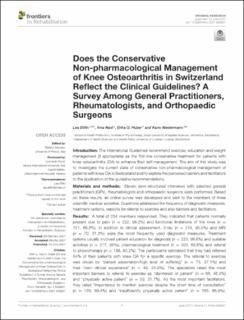Please use this identifier to cite or link to this item:
https://doi.org/10.21256/zhaw-23056| Publication type: | Article in scientific journal |
| Type of review: | Peer review (publication) |
| Title: | Does the conservative non-pharmacological management of knee osteoarthritis in Switzerland reflect the clinical guidelines? : a survey among general practitioners, rheumatologists, and orthopaedic surgeons |
| Authors: | Ettlin, Lea Nast, Irina Huber, Erika O. Niedermann Schneider, Karin |
| et. al: | No |
| DOI: | 10.3389/fresc.2021.658831 10.21256/zhaw-23056 |
| Published in: | Frontiers in Rehabilitation Sciences |
| Volume(Issue): | 2 |
| Issue: | 658831 |
| Issue Date: | Jun-2021 |
| Publisher / Ed. Institution: | Frontiers Research Foundation |
| ISSN: | 2673-6861 |
| Language: | English |
| Subjects: | Osteoarthritis management; Conservative treatment; Exercise; Knee pain; Primary care (MeSH) |
| Subject (DDC): | 616.7: Diseases of musculoskeletal system and orthopaedics |
| Abstract: | Introduction: The International Guidelines recommend exercise, education and weight management (if appropriate) as the first-line conservative treatment for patients with knee osteoarthritis (OA) to enhance their self-management. The aim of this study was to investigate the current state of conservative non-pharmacological management of patients with knee OA in Switzerland and to explore the perceived barriers and facilitators to the application of the guideline recommendations. Materials and methods: Eleven semi-structured interviews with selected general practitioners (GPs), rheumatologists and orthopaedic surgeons were performed. Based on these results, an online survey was developed and sent to the members of three scientific medical societies. Questions addressed the frequency of diagnostic measures, treatment options, reasons for referral to exercise and also barriers and facilitators. Results: A total of 234 members responded. They indicated that patients normally present due to pain (n = 222, 98.2%) and functional limitations of the knee (n = 151, 66.8%). In addition to clinical assessment, X-ray (n = 214, 95.5%) and MRI (n = 70, 31.3%) were the most frequently used diagnostic measures. Treatment options usually involved patient education for diagnosis (n = 223, 98.6%) and suitable activities (n = 217, 96%), pharmacological treatment (n = 203, 89.8%) and referral to physiotherapy (n = 188, 83.2%). The participants estimated that they had referred 54% of their patients with knee OA for a specific exercise. The referral to exercise was driven by “patient expectation/high level of suffering” (n = 73, 37.1%) and their “own clinical experience” (n = 49, 24.9%). The specialists rated the most important barriers to referral to exercise as “disinterest of patient” (n = 88, 46.3%) and “physically active patient” (n = 59, 31.1%). As the most important facilitators, they rated “importance to mention exercise despite the short time of consultation” (n = 170, 89.4%) and “insufficiently physically active patient” (n = 165, 86.9%). Discussion: A substantial evidence–performance gap in the management of patients with knee OA appears to exist in Switzerland. For the systematic referral to exercise as the first-line intervention, it might be useful for medical doctors to suggest a structured exercise programme to patients with knee OA, rather than just advising general exercise. |
| URI: | https://digitalcollection.zhaw.ch/handle/11475/23056 |
| Fulltext version: | Published version |
| License (according to publishing contract): | CC BY 4.0: Attribution 4.0 International |
| Departement: | School of Health Sciences |
| Organisational Unit: | Institute of Physiotherapy (IPT) |
| Appears in collections: | Publikationen Gesundheit |
Files in This Item:
| File | Description | Size | Format | |
|---|---|---|---|---|
| 2021_Ettlin-etal_Conservative-management-of-knee-osteoarthritis-Switzerland.pdf | 551.92 kB | Adobe PDF |  View/Open |
Show full item record
Ettlin, L., Nast, I., Huber, E. O., & Niedermann Schneider, K. (2021). Does the conservative non-pharmacological management of knee osteoarthritis in Switzerland reflect the clinical guidelines? : a survey among general practitioners, rheumatologists, and orthopaedic surgeons. Frontiers in Rehabilitation Sciences, 2(658831). https://doi.org/10.3389/fresc.2021.658831
Ettlin, L. et al. (2021) ‘Does the conservative non-pharmacological management of knee osteoarthritis in Switzerland reflect the clinical guidelines? : a survey among general practitioners, rheumatologists, and orthopaedic surgeons’, Frontiers in Rehabilitation Sciences, 2(658831). Available at: https://doi.org/10.3389/fresc.2021.658831.
L. Ettlin, I. Nast, E. O. Huber, and K. Niedermann Schneider, “Does the conservative non-pharmacological management of knee osteoarthritis in Switzerland reflect the clinical guidelines? : a survey among general practitioners, rheumatologists, and orthopaedic surgeons,” Frontiers in Rehabilitation Sciences, vol. 2, no. 658831, Jun. 2021, doi: 10.3389/fresc.2021.658831.
ETTLIN, Lea, Irina NAST, Erika O. HUBER und Karin NIEDERMANN SCHNEIDER, 2021. Does the conservative non-pharmacological management of knee osteoarthritis in Switzerland reflect the clinical guidelines? : a survey among general practitioners, rheumatologists, and orthopaedic surgeons. Frontiers in Rehabilitation Sciences. Juni 2021. Bd. 2, Nr. 658831. DOI 10.3389/fresc.2021.658831
Ettlin, Lea, Irina Nast, Erika O. Huber, and Karin Niedermann Schneider. 2021. “Does the Conservative Non-Pharmacological Management of Knee Osteoarthritis in Switzerland Reflect the Clinical Guidelines? : A Survey among General Practitioners, Rheumatologists, and Orthopaedic Surgeons.” Frontiers in Rehabilitation Sciences 2 (658831). https://doi.org/10.3389/fresc.2021.658831.
Ettlin, Lea, et al. “Does the Conservative Non-Pharmacological Management of Knee Osteoarthritis in Switzerland Reflect the Clinical Guidelines? : A Survey among General Practitioners, Rheumatologists, and Orthopaedic Surgeons.” Frontiers in Rehabilitation Sciences, vol. 2, no. 658831, June 2021, https://doi.org/10.3389/fresc.2021.658831.
Items in DSpace are protected by copyright, with all rights reserved, unless otherwise indicated.